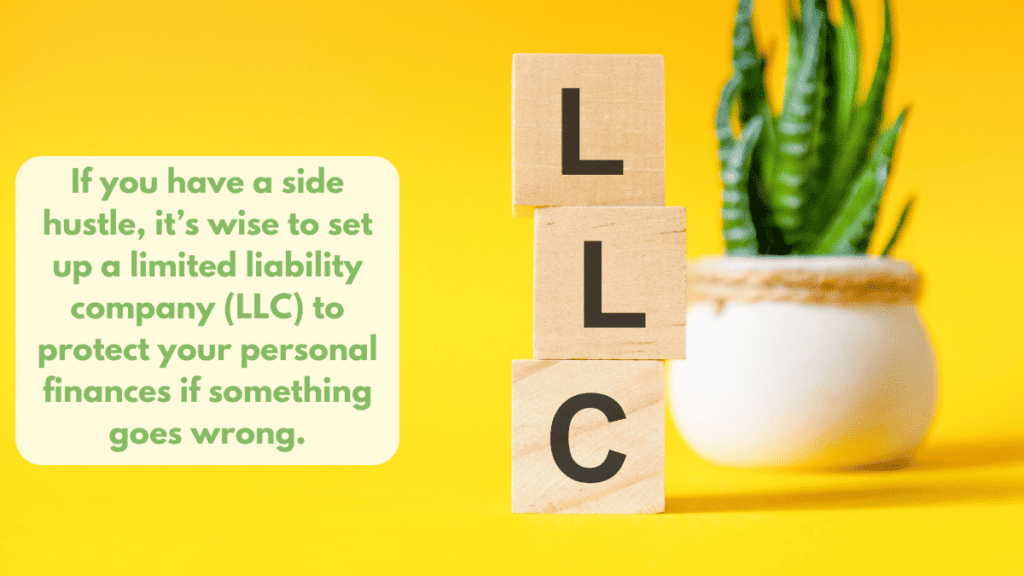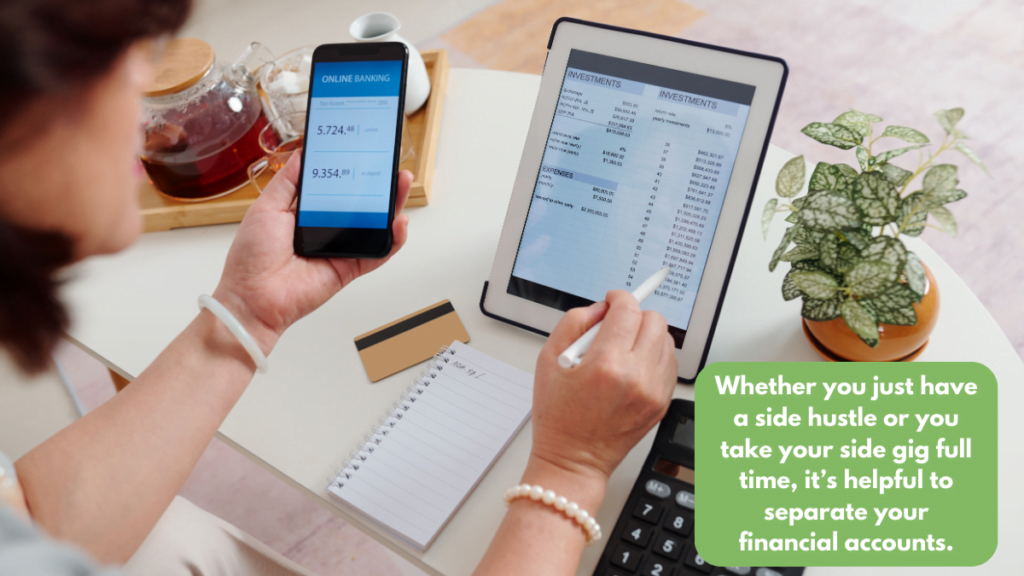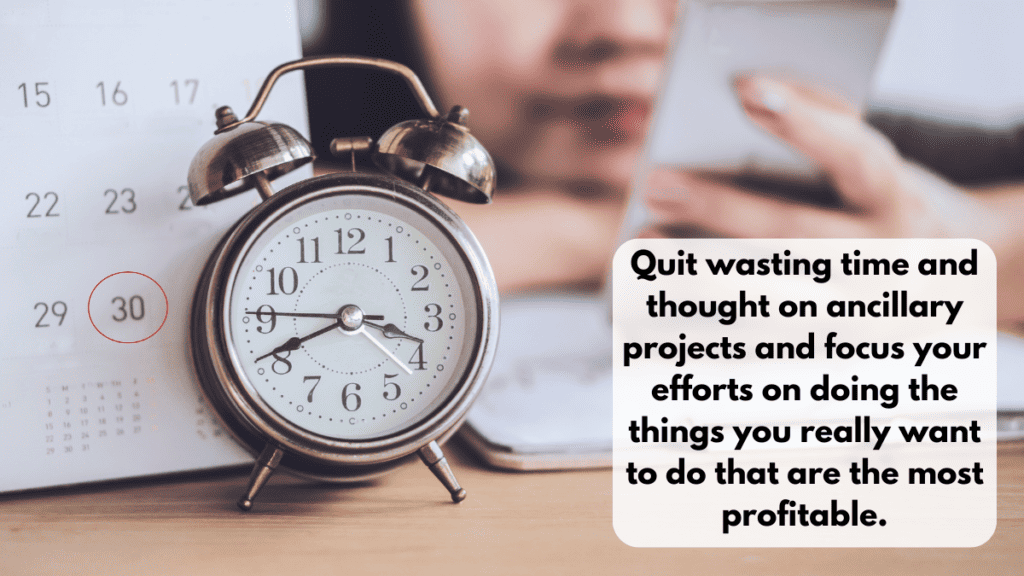If you are money-minded like me, you likely understand the importance of diversifying your income. Chances are that, in addition to working your regular job, you are pursuing a side hustle or two to give your budget a boost!
But what happens when your side hustle starts growing so much that it’s interfering with your full-time job? Is making the jump into self-employment the right move?
Here’s everything you need to know about making the change from side hustle to full-time entrepreneur!
What To Consider Before Becoming Self-Employed
Deciding to quit your job to pursue self-employment is complex. The prospect of working for yourself can be seductive, but you are leaving the world of comfort, familiarity, and a steady paycheck for a world full of unknowns.
Here are some things you should consider before taking the leap with your side hustle.
Taxes
Two things are certain in life: death and taxes. I swear it feels like self-employed people pay more in taxes.
If you plan to run your own business or you have a side hustle that’s producing income, it’s your job to take out taxes. To stay on top of your taxes, be prepared to take 30% off the top of each payment. It’s painful, but it’s better to be safe than sorry.
I have always gotten a tax refund, and the first year I was self-employed was the first year that I owed Uncle Sam. It caught me off guard, even though it was a few hundred bucks. Now, I’m much more diligent with saving for taxes.
Long-Term Sustainability
Self-employment isn’t a vacation or something you should do “just to try.” It’s important to consider the long-term sustainability of your side hustle. It’s easy to fail and hard to go back to full-time employment.
You need to make your work sustainable and scalable so that you can continue to grow. Ensure that your side hustle can accommodate these needs. Otherwise, you may want to reconsider leaving your full-time job behind.
Being the Boss
One of the most rewarding and challenging aspects of being self-employed is that YOU are the boss. For the first month of self-employment, my schedule was completely out of whack. It was the first time I had no one telling me what to do. Technically, I could do whatever I wanted.
Learning how to stay focused was harder than I expected. Without someone peering over your shoulder, clocking in and out, and checking in every day, it is easy to lose track of where your time is going. You need to stay focused and manage your time and projects. It’s all on you.
I also struggled to embrace the idea that I was the boss. A common mistake many new freelancers make is thinking their clients are their bosses. They feel like they have 10 mini-bosses, and it’s worse than having one boss at their old job.
The people you contract with are your clients, not your bosses. Yes, you still rely on their payment and have deadlines to abide by. But you set the terms. If you are sick of working for a client, find a new one. If you are unhappy about the pay rate, negotiate.
Multiple Responsibilities
Being self-employed means that you wear many hats at all times. Suddenly, you are a one-person show that acts as the HR, marketing, accounting, and operations departments.
You are never just your work title. Essentially, you do all the work of a small agency to make sure things keep running. Self-doubt can easily creep in, so it’s important to be confident and have a strong emotional and financial foundation to keep you steady.

Ask the Hard Questions
Before you take the leap and take your side hustle full-time, ask yourself some difficult questions:
- How much have you saved up in case all your clients drop you?
- What are you willing to give up in order to succeed?
- What is the bare minimum you need to survive financially?
- How does this align with your life goals and values?
- When will you know it’s time to dump a client, and how will you do it?
- Can you see yourself doing this in five years? 10 years? 20 years?
- How do you stand out from your competitors?
- Can you handle putting 30% of your money toward taxes?
- Are you ok with having an irregular paycheck?
- Do you consider yourself confident?
- How will you deal with an unhappy client?
- Are you doing this for the money or because you love your side hustle?
- Do you have a mentor to guide you?
- Are your friends and family supportive of what you are doing?
- What checks and balances will you have in place to measure success?
- Are you prepared for the worst-case scenario?
- What systems do you have in place to stay on task and organized?
- Do you consider this a hobby or a profession?
- What do you want to learn from this?
Answering these questions can guide you through the process of seeing if self-employment is right for you.
Signs Your Side Hustle Has Become Your Career
If you think you are up for the demands of self-employment, it’s important to evaluate whether or not your side hustle can actually replace your career.
Before giving your two-week notice, here are some signs that your side gig could be your full-time job.
You Are Actively Turning Away Clients
This is something my wife and I faced before I left my last corporate job. She was at the point in which she was forced to decide which clients we had to turn away.
There was only so much time in the day, and we could only do so much. We already had a stable client base, but we had to consider turning away new ones. This was the big sign we needed to turn our side business into something more.
Not only does turning away clients keep you from making more money, but word can also spread that you’re unable to manage the workload. If you’re anywhere close to considering going it on your own full-time, that’s the last thing you want.
Your Side Hustle Income Exceeds Your Day Job
This sign is a no-brainer, but it still needs to be said. If you’re regularly making more per month in your side hustle than your day job, then it’s a good sign that you have a budding business on your hands.
That said, before you take the leap, have an emergency fund in place. Depending on your specific circumstances, this will likely take you some time to build up. However, you don’t want to take the leap into running your own business and have nothing to fall back on.
As someone who has been through it, what people don’t tell you is that your income will fluctuate. You undoubtedly want to be prepared for that.
You’re Adding New Streams of Income
Having multiple streams of income is vitally important if you’re looking to go for it on your own. This will allow you to weather the ups and downs of running your own business.
If you’re adding these streams to your side hustle while you are still in your day job, this will take even more time. It can also mean more income for you. Eventually, you’ll reach a breaking point where you can only do so much.
At that point, you’ll want to assess how your side hustle is progressing and if it’s something you can take further. Nevertheless, if you’re actively bringing on additional streams of income, then it’s a possibility you have something you can grow if you have even more time to devote to it.

Navigating Small Business Bank Accounts
If you have a side hustle, especially one that you are going to take full-time, it’s wise to set up a limited liability company (LLC) to protect your personal finances if something goes wrong. Then, to ensure your LLC does its job, setting up business bank accounts is helpful.
But why is this beneficial, and how can you choose the right account?
Why You Want a Small Business Bank Account
A small business bank account can take your side hustle to the next level for a couple of reasons. Not only will these accounts make your company more legitimate in the eyes of your customers, but they will also simplify tracking your business finances.
It’s More Professional
One great reason to open a business bank account for your small business, no matter how small, is for professionalism. With a business bank account, you can accept payments written to your company. Plus, you can write checks from your company.
This is huge in the eyes of a customer. Rather than writing a check to your name, they write it to your business. This gives a sense of confidence and professionalism that using a personal name does not.
It’s Easy to Track
Tracking your business income and expenses is important. Depending on how you structure your business, your company’s income and expenses are listed differently on your taxes than your personal income. Tracking that separately can be helpful when tax season comes around.
All business expenses in the United States can be deducted from your income to lower your tax liability. If you can’t find records for your business expenses, you can’t deduct them.
To make it easier to track, open a business bank account. Then, put all your business revenue and expenses through that account so you can easily find your records when needed.
How To Find a Bank That Meets Your Needs
Not all banks are created equal. Some business accounts come with high fees, while others have bad customer service or poor offerings. Make sure you find a bank that fits your business needs and is responsive when you need help.
With many commercial finance institutions to choose from, finding the best match can be challenging. Here are a few things to look for when starting out:
- No-fee or low-fee business checking accounts
- Merchant support for accepting credit cards
- Free credit and debit card options
- Multiple business account types
Some banks only offer simple accounts for businesses, like checking and savings. Other institutions have more complex offerings like factoring. This is when a company sells its accounts receivables to a third party at a discount to get the cash upfront.
Whatever you do, make sure your bank meets your needs and does not charge you fees to do it. If you spend the time to find the right bank, you will find yourself in a great, long-term financial relationship.
Tax Tips for Self-Employed Workers
Once you stop working for your employer and start working for yourself, taxes can become even more complex. There is some debate as to whether or not you should pay someone to do your taxes, but for me, it made sense to go that route.
However, even if you get help with your taxes, that does not let you off the hook in terms of tax preparation. With that in mind, here are some tax tips to follow if you’re about to become self-employed.

Keep Things Separate
As mentioned, whether you have a side hustle or take your side gig full-time, having separate bank accounts is helpful. It’s also beneficial to separate other financial accounts.
For example, keep your personal and business credit cards separate. If you are self-employed and plan to do a lot of business spending, you’ll likely want a different business card. Be careful, though, as many business credit cards charge an annual fee.
While these fees can be deductible, you want to avoid paying too much in fees. Since you will likely be filing separate business taxes, this will simplify the process.
Automate Where You Can
Automation can be vital to ensuring things go smoothly at tax time. Running your own business can take a ton of effort, and you want to reduce the number of time-consuming tasks on your plate.
I do this through Freshbooks since it allows us to manage our invoicing and expenses, but many other options are available.
If automation is not your thing, you can always set up a simple spreadsheet to keep track of your tax-related issues. Just don’t do what I did during the first year of my business. I avoided doing any of this and paid dearly in terms of time when we needed to prepare our taxes.
Retirement Is Your Friend
Retirement may seem like an outside-the-box tax tip for self-employed individuals, but it very much fits here. If you run your own business, you likely aren’t receiving any 401k match. This means that retirement falls on you as an individual.
The great thing is that the IRS encourages you to save for retirement if you’re self-employed. Several options are available, with SEP IRAs, Solo 401ks, and SIMPLE IRAs being the most common.
In most cases, these allow you to contribute significant amounts towards retirement. If that isn’t beneficial enough, another big carrot is that the contributions can lower your tax liability. This is a double bonus in my book!
Insurance Coverage for Small Business Owners
You likely know about your personal insurance needs, but if you are an entrepreneur with a side hustle, you have a whole different list of needs. Protecting your business, employees, and yourself from accidents and lawsuits is critical, especially if you are making your side hustle your full-time gig.
When it comes to where to get coverage, it’s important to shop around when you are purchasing a new policy. Price differences and service levels can vary dramatically between companies.
As you start shopping for coverage, here are some options you should consider.
Indemnity
Indemnity insurance protects you from any major “oops” that can happen when you run a company. This type of policy covers negligence, accidental contract breaches, loss of data, and loss of goods.
Liability
If one of your employees goes onto a customer’s property and breaks something, you must pay for it. That is where liability comes into play. Injuries to third parties and damage to third-party property are both covered by a liability policy.
Liability also covers you if your product or service injures someone.
Property Insurance
If your company has a physical office, factory, or warehouse, property insurance covers that location against damage caused by various problems, including weather, fire, earthquakes, and other unexpected events.
These policies generally cover the contents of the location, such as computer equipment and manufacturing equipment.
Business Interruption Insurance
If you are struck by a tornado, your office and equipment are covered by property insurance. However, the revenues you lose when you can’t operate are not covered.
Insurance policies that cover you in case your business has to temporarily cease operations are available. Your livelihood and your employees’ livelihoods depend on your business continuing to operate. Make sure you are covered by a good policy, just in case.

Balancing Work, Life, and Being an Entrepreneur
I attended a FinCon conference that ended with an incredible talk by professional speaker Grant Baldwin. He shared some advice that I’ve taken to heart as an entrepreneur. Hopefully, these suggestions can help you find balance as you embark on your self-employment journey.
Focus On One Thing and Do It Well
I have a problem that I imagine I share with many of you. I am often inspired by an idea and start a new blog or business on a whim. That has led to projects like my former site, Beer is Sexy / PDX Off The Wagon, something I wanted to do but did not have the time for.
I eventually shut down that site, which opened up lots of mental space and some time to focus on the projects where I bring in most of my online income, like this site and my freelancing business.
Grant was right. I needed to quit wasting time and thought on ancillary projects and focus my efforts on doing the things I really wanted to do that were the most profitable.
Be Present
I am an admitted workaholic, and I know this working style detracts from my family time.
Grant said his kids don’t care about his blog or email list. They just want him there paying attention to them.
This really hit home for me. Time goes quickly, and I do not want to miss out on being a dad or have my kids miss out on the time they want to spend with me because of my work.
I see people miss so much of their parenting experience because of work. It’s essential for me to remember that working is a means to an end, not an end. While making money is great, it shouldn’t get in the way of spending time with loved ones.
Take Internet Vacation Days
Along with being a workaholic, I am a bit of an internet addict. I hang out on the couch with my wife while we watch Netflix, but I do it with my laptop on my lap. I go with her to walk the dogs but spend time checking my email, Instagram, Facebook, and other little pop-ups on my phone.
My wife is gracious and does not give me too hard of a time, but she probably should give me a harder time. Outside of our vacations, I’m connected more than I’m not.
Grant reminded me of something totally true and a good reminder for internet addicts. The internet is not going anywhere. All those notifications will still be there when we return if we take a day off.
Schedule “Do Nothing” Time
My calendar used to be pretty crazy, and that was my fault. While my income has gone way up, I have started to find better ways to balance my work and personal life.
I recommend scheduling a time when you have zero plans. Nothing with friends. No work allowed. Just family time. Maybe we’ll explore Ventura. Maybe we’ll hang out at home. Who knows?
I might double up my no internet day with a scheduled do-nothing day.
Upgrade Your Freelance Work
As you start nearing capacity with your schedule, it’s time to start pursuing client upgrades.
This can include onboarding new clients who pay better or have more appealing projects for you to work on. It also means getting rid of ones that don’t pay enough or don’t interest you.
Beyond that, it could involve outsourcing some of your work. This would mean that instead of being a solopreneur, you are growing your company. Expanding should always be something you have in mind as a potential next step.
The Bottom Line
Reaching the point where you can consider making your side hustle a full-time job is exciting. If you have gotten to that point, carefully consider if this switch is what you want and take the steps needed to ensure the transition is smooth.
With some thought and adequate preparation, you can successfully make the jump from employee to full-time entrepreneur!


